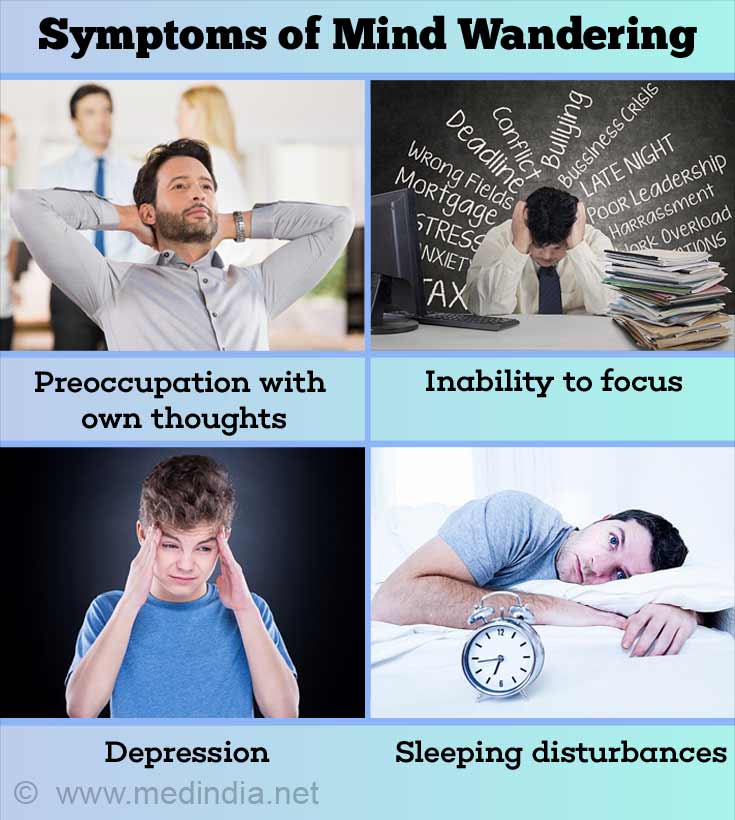A Wandering Mind Isn't Just A Distraction. It May Be Your Brain's Default State.
Senior Writer, The Huffington Post

Even if you don’t consider yourself a daydreamer, you probably spend a lot of time in a state of mental wandering ― it’s natural for your mind to drift away from the present moment when you’re in the shower, walking to work or doing the dishes.
In recent years, scientists have been paying a lot more attention to mind-wandering, an activity that takes up as much as 50 percent of our waking hours . Psychologists previously tended to view mind-wandering as largely useless, but an emerging body of research suggests that it is a natural and healthy part of our mental lives.
Researchers from the University of British Columbia and the University of California, Berkeley conducted a review of over 200 studies to highlight the relationship between mind-wandering ― often defined in psychological literature as “task-unrelated thought,” or TUT ― and the thinking processes involved in creativity and some mental illnesses, including attention deficit hyperactivity disorder, anxiety and depression.
“Sometimes the mind moves freely from one idea to another, but at other times it keeps coming back to the same idea, drawn by some worry or emotion,” Dr. Kalina Christoff, lead study author and principal investigator of the Cognitive Neuroscience of Thought Laboratory at UBC, said in a statement.
“Understanding what makes thought free and what makes it constrained is crucial because it can help us understand how thoughts move in the minds of those diagnosed with mental illness,” she said.

The Role Of A Wandering Mind
Traditionally, mind-wandering has been defined as thinking that arises spontaneously, without relating to any sort of task or external input. But this definition is only a starting point: Without external focus, the researchers explain, the mind moves from one thought to another ― jumping between memories, imaginings, plans and goals.
This default “spontaneous mode” can be hemmed in in two ways: A person can deliberately turn their attention to a task, or, in the case of someone with a mental health issue, focus can happen because thoughts have gotten stuck on a persistent worry or pulled away by an environmental distraction.
On a neurological level, the brain’s default mode network ― a broad network that engages many different cognitive processes and regions on the internal surface of the brain ― activates when our minds wander. In contrast, when we focus our attention on a goal, plan or environmental stimulus, the part of the brain devoted to external attention is more active.
Specifically, the researchers pinpointed the memory and imaginative centers within the default mode network as being largely responsible for the variety of our spontaneous thoughts.
“You’re jumping around from one thing to another,” Zachary Irving, a postdoctoral scholar at the University of California, Berkeley and study co-author who has ADHD, told The Huffington Post. “We think that’s the default state of these memory and imaginative structures.”
A Creative Mind Is A Wandering Mind
Creative thinking can be an extension of ordinary mind-wandering, the researchers explained, and a growing body of research has linked daydreaming with creativity . In highly creative people, psychologists have observed a tendency toward a variation on mind-wandering known as “ positive-constructive daydreaming ,” in which has also been associated with self-awareness, goal-oriented thinking and increased compassion.
The free play of thoughts that occurs in mind-wandering may enable us to think more flexibly and draw more liberally upon our vast internal reservoir of memories, feelings and images in order to create new and unusual connections.
“Mind-wandering in the sense of the mind moving freely from one idea to another has huge benefits in terms of arriving at new ideas,” Christoff said. “It’s by virtue of free movement that we generate new ideas, and that’s where creativity lies.”

What Mind-Wandering Can Tell Us About Mental Illness
This type of mental activity can provide an important window into the thinking patterns that underly psychological disorders involving alterations in spontaneous thought.
The mind of someone with ADHD, for example, wanders more widely and frequently than that of an average individual. In someone with anxiety and depression, the mind has an unusually strong tendency to get stuck on a particular worry or negative thought.
“Disorders like ADHD and anxiety and depression aren’t totally disconnected from what normally goes on in the mind,” Irving said. “There’s this ordinary ebb and flow of thoughts, where you’re moving from mind-wandering to sticky thoughts to goal-directed thoughts. ... We think of these disorders as exaggerated versions of those sorts of ordinary thoughts.”
So despite what your elementary school teachers may have told you, it’s perfectly fine to let your thoughts wander every once in a while. But if you find your mind wandering too much or getting stuck on negative thoughts, it may be time to seek help.
Before You Go

The Best Books For Unlocking Creativity
From our partner, huffpost shopping’s best finds, more in life.

It’s normal for your mind to wander. Here’s how to maximise the benefits
Psychology researcher, Bond University
Associate Professor in Psychology, Bond University
Disclosure statement
The authors do not work for, consult, own shares in or receive funding from any company or organisation that would benefit from this article, and have disclosed no relevant affiliations beyond their academic appointment.
Bond University provides funding as a member of The Conversation AU.
View all partners
Have you ever found yourself thinking about loved ones during a boring meeting? Or going over the plot of a movie you recently watched during a drive to the supermarket?
This is the cognitive phenomenon known as “ mind wandering ”. Research suggests it can account for up to 50% of our waking cognition (our mental processes when awake) in both western and non-western societies .
So what can help make this time productive and beneficial?
Mind wandering is not daydreaming
Mind wandering is often used interchangeably with daydreaming. They are both considered types of inattention but are not the same thing.
Mind wandering is related to a primary task, such as reading a book, listening to a lecture, or attending a meeting. The mind withdraws from that task and focuses on internally generated, unrelated thoughts.
On the other hand, daydreaming does not involve a primary, active task. For example, daydreaming would be thinking about an ex-partner while travelling on a bus and gazing out the window. Or lying in bed and thinking about what it might be like to go on a holiday overseas.
If you were driving the bus or making the bed and your thoughts diverted from the primary task, this would be classed as mind wandering.

The benefits of mind wandering
Mind wandering is believed to play an important role in generating new ideas , conclusions or insights (also known as “aha! moments”). This is because it can give your mind a break and free it up to think more creatively.
This type of creativity does not always have to be related to creative pursuits (such as writing a song or making an artwork). It could include a new way to approach a university or school assignment or a project at work. Another benefit of mind wandering is relief from boredom, providing the opportunity to mentally retreat from a monotonous task.
For example, someone who does not enjoy washing dishes could think about their upcoming weekend plans while doing the chore. In this instance, mind wandering assists in “passing the time” during an uninteresting task.
Mind wandering also tends to be future-oriented. This can provide an opportunity to reflect upon and plan future goals, big or small. For example, what steps do I need to take to get a job after graduation? Or, what am I going to make for dinner tomorrow?

Read more: Alpha, beta, theta: what are brain states and brain waves? And can we control them?
What are the risks?
Mind wandering is not always beneficial, however. It can mean you miss out on crucial information. For example, there could be disruptions in learning if a student engages in mind wandering during a lesson that covers exam details. Or an important building block for learning.
Some tasks also require a lot of concentration in order to be safe. If you’re thinking about a recent argument with a partner while driving, you run the risk of having an accident.
That being said, it can be more difficult for some people to control their mind wandering. For example, mind wandering is more prevalent in people with ADHD.
Read more: How your brain decides what to think
What can you do to maximise the benefits?
There are several things you can do to maximise the benefits of mind wandering.
- be aware : awareness of mind wandering allows you to take note of and make use of any productive thoughts. Alternatively, if it is not a good time to mind wander it can help bring your attention back to the task at hand

context matters : try to keep mind wandering to non-demanding tasks rather than demanding tasks. Otherwise, mind wandering could be unproductive or unsafe. For example, try think about that big presentation during a car wash rather than when driving to and from the car wash
content matters : if possible, try to keep the content positive. Research has found , keeping your thoughts more positive, specific and concrete (and less about “you”), is associated with better wellbeing. For example, thinking about tasks to meet upcoming work deadlines could be more productive than ruminating about how you felt stressed or failed to meet past deadlines.
- Consciousness
- Daydreaming
- Concentration
- Mind wandering
PhD Scholarship

Senior Lecturer, HRM or People Analytics

Senior Research Fellow - Neuromuscular Disorders and Gait Analysis

Centre Director, Transformative Media Technologies

Postdoctoral Research Fellowship

Where Does Your Mind Wander—And Does It Matter?

If you’ve tried meditation, one of the first mental experiences you probably become aware of is that your mind doesn’t tend to stay in one place. “Mind wandering” is an extremely common occurrence, with studies suggesting it makes up nearly half of our waking lives. When our minds wander, they can go nearly anywhere—from negative thoughts and emotions like worry or rumination, to positive thoughts like creative planning, wishing well for others, or gratitude. Research continues to build about mind wandering during meditation, but little has been explored about the varying effects of the content of mind wandering. Does what you think about during meditation change the possible outcomes?
Co-author Tracy Brandmeyer and I recently published an article entitled “When the meditating mind wanders” in a comprehensive special issue of Current Opinion in Psychology on mindfulness. In our paper, we consider whether chronic thinking (e.g., mind wandering) associated with strong emotional arousal during meditation practice might be detrimental to meditation practice and well-being. As humans, we all have the capacity for thought and the ability to assemble and manipulate concepts in our minds. Spontaneous thoughts often occur when we are engaged in attention-demanding tasks such as reading, and an increased frequency of thoughts has been associated with negative affect. Meditation does not require thinking; however, thinking in the form of mind wandering occurs naturally during meditation.
One goal of meditation is to identify emotions and thoughts that arise, and to remain equanimous with them—that is, to not judge them, or push them away, or cling to them. Over time, meditation may help dampen the attention-grabbing power of these thoughts both during practice and in daily life, which may consequently help deepen meditation practice. In fact, we have shown in an article published in Experimental Brain Research that experienced meditators’ minds wander less than the minds of novices. This is encouraging for meditators.
However, when meditators fail to remain equanimous, the effects of thoughts that arise during practice could be detrimental. In other words, meditating while being upset might actually be worse than not meditating. This is because negative arousal could actually reinforce those thoughts, leading to more negative thoughts in the future. More research will be needed to test this hypothesis. If verified, it would mean that one should probably not meditate if they feel strong resistance about doing so, or if they feel they are not successful at remaining equanimous with the emotional thoughts that cross their mind.
We feel it is important to further explore how emotional responses to one’s own mind wandering might impact outcomes of practice, as understanding this relationship can inform how meditation is taught and applied in various settings.
Read the full paper >>
Mind & Life Connections

Special Issue on Mindfulness
Mind and Life Institute • October 16, 2019
Topics: Brain & Cognitive Science | Mindfulness

- Mission and Values
- Equity, Diversity, and Inclusion
- Dialogues and Conversations
- Summer Research Institute
- Mind & Life Connect
- Inspiring Minds
- Varela Grants
- PEACE Grants
- Contemplative Changemaking Grants
- Mentorship Program
- Insights Essays
- The Mind & Life Digital Library
- Mind & Life Podcast
- Online Courses
- Documentaries
- Open Access Academic Papers
- Ways to Give
- Annual Reports
Greater Good Science Center • Magazine • In Action • In Education
How to Focus a Wandering Mind
We’ve all been there. You’re slouched in a meeting or a classroom, supposedly paying attention, but your mind has long since wandered off, churning out lists of all the things you need to do—or that you could be doing if only you weren’t stuck here…
Suddenly you realize everyone is looking your way expectantly, waiting for an answer. But you’re staring blankly, grasping at straws to make a semi-coherent response. The curse of the wandering mind!
But don’t worry—you’re not alone. In fact, a recent study by Matthew Killingsworth and Daniel Gilbert sampled over 2,000 adults during their day-to-day activities and found that 47 percent of the time, their minds were not focused on what they were currently doing. Even more striking, when people’s minds were wandering, they reported being less happy.

This suggests it might be good to find ways to reduce these mental distractions and improve our ability to focus. Ironically, mind-wandering itself can help strengthen our ability to focus, if leveraged properly. This can be achieved using an age-old skill: meditation. Indeed, a new wave of research reveals what happens in our brains when our minds wander—and sheds light on the host of cognitive and emotional benefits that come with increased focus.
What happens in the wandering mind?
For something that happens so often, what do we really know about this process of mind-wandering?
For thousands of years, contemplative practices such as meditation have provided a means to look inward and investigate our mental processes. It may seem surprising, but mind-wandering is actually a central element of focused attention (FA) meditation. In this foundational style of meditation, the practitioner is instructed to keep her attention on a single object, often the physical sensations of breathing.
Sounds simple enough, but it’s much easier said than done. Try it for a few minutes and see what happens.
If you’re like most people, before long your attention will wander away into rumination, fantasy, analyzing, planning. At some point, you might realize that your mind is no longer focused on the breath. With this awareness, you proceed to disengage from the thought that had drawn your mind away, and steer your attention back to your breath. A few moments later, the cycle will likely repeat.
At first it might seem like the tendency toward mind-wandering would be a problem for the practice of FA meditation, continually derailing your attention from the “goal” of keeping your mind on the breath.
However, the practice is really meant to highlight this natural trajectory of the mind, and in doing so, it trains your attention systems to become more aware of the mental landscape at any given moment, and more adept at navigating it. With repeated practice, it doesn’t take so long to notice that you’ve slipped into some kind of rumination or daydream. It also becomes easier to drop your current train of thought and return your focus to the breath. Those who practice say that thoughts start to seem less “sticky”—they don’t have such a hold on you.
As a neuroscientist and meditator, I’d long been fascinated with what might be happening in my brain when I meditate. Being familiar with both subjective, first-person meditative practice and objective, third-person scientific research, I wondered what would happen if I put these two modes of investigation together. Could I get a more fine-grained picture of how this process works in the brain by leveraging the experience of these cognitive shifts during meditation?
I started by considering the default mode network, a set of brain areas that tend to increase in activity when we’re not actively engaged in anything else—in other words, when our minds tend to wander. Maybe it was this default mode network that kept barging in during my meditation, interfering with my ability to keep my attention focused. And maybe this network was what I was learning to “tune down” by practicing over and over. I wondered if I could test this scientifically.
Supported by funding from the Mind & Life Institute , and with the help of colleagues at Emory University, I started to test which brain areas were related to meditation. We asked meditators to focus on their breath while we scanned their brains: whenever they realized their minds had been wandering, they’d press a button. Then they would return their focus to the breath as usual, and the practice would continue. As they did so, we collected MRI data showing which brain regions were active before, during, or after the button press that corresponded to various mental states.
The study, published in the journal NeuroImage , found that, indeed, during periods of mind-wandering, regions of the brain’s default mode network were activated. Then when participants became aware of this mind-wandering, brain regions related to the detection of salient or relevant events came online. After that, areas of the executive brain network took over, re-directing and maintaining attention on the chosen object. And all of this occurred within 12 seconds around those button presses.
Looking at activity in these brain networks this way suggests that when you catch your mind wandering, you are going through a process of recognizing, and shifting out of, default mode processing by engaging numerous attention networks. Understanding the way the brain alternates between focused and distracted states has implications for a wide variety of everyday tasks. For example, when your mind wandered off in that meeting, it might help to know you’re slipping into default mode—and you can deliberately bring yourself back to the moment. That’s an ability that can improve with training.
The benefits of building focus
What are other practical implications of this knowledge? Recent behavioral research shows that practicing meditation trains various aspects of attention . Studies show that meditation training not only improves working memory and fluid intelligence , but even standardized test scores .
It’s not surprising—this kind of repeated mental exercise is like going to the gym, only you’re building your brain instead of your muscles. And mind-wandering is like the weight you add to the barbell—you need some “resistance” to the capacity you’re trying to build. Without mind-wandering to derail your attempts to remain focused, how could you train the skills of watching your mind and controlling your attention?
In our study, we also wanted to look at the effects of lifetime meditation experience on brain activity. In agreement with a growing number of studies, we found that experience mattered—those who were more experienced meditators had different levels of brain activity in the relevant networks. This suggests that their brains may have changed due to repeated practice, a process called neuroplasticity.
One brain area stood out in this analysis: the medial prefrontal cortex, a part of the default mode network that is particularly related to self-focused thoughts , which make up a good portion of mind-wandering content. It turns out that experienced meditators deactivated this region more quickly after identifying mind-wandering than people who hadn’t meditated as much—suggesting they might be better at releasing distracting thoughts, like a re-hash of a personal To Do list or some slight they suffered at work yesterday.
In a follow-up study, we found that these same participants had greater coherence between activity in the medial prefrontal cortex and brain areas that allow you to disengage attention . This means that the brain regions for attentional disengagement have greater access to the brain regions underlying the distraction, possibly making it easier to disengage. Other findings support this idea—more experienced meditators have increased connectivity between default mode and attention brain regions, and less default mode activity while meditating.
This might explain how it feels easier to “drop” thoughts as you become more experienced in meditation—and thus better able to focus. Thoughts become less sticky because your brain gets re-wired to be better at recognizing and disengaging from mind-wandering. And if you’ve ever struggled with rumination—re-living a negative experience over and over, or stressing (unproductively) about an upcoming event—you can appreciate how being able to let go of your thoughts could be a huge benefit.
Indeed, the Killingsworth and Gilbert study I mentioned earlier found that when people’s minds were wandering, they tended to be less happy , presumably because our thoughts often tend towards negative rumination or stress. That’s why mindfulness meditation has become an increasingly important treatment of mental health difficulties like depression , anxiety , post-traumatic stress disorder , and even sexual dysfunction .
More on Mindfulness & Mind-Wandering
Learn more about how mind-wandering can make you unhappy
How mindful are you? Take our quiz!
Watch Jon Kabat-Zinn talk about mindfulness .
Reading all this might make you think that we’d be better off if we could live our lives in a constant state of laser-like, present moment focus. But a wandering mind isn’t all bad. Not only can we leverage it to build focus using FA meditation, but the capacity to project our mental stream out of the present and imagine scenarios that aren’t actually happening is hugely evolutionarily valuable, which may explain why it’s so prominent in our mental lives. These processes allow for creativity, planning, imagination, memory—capacities that are central not only to our survival, but also to the very essence of being human.
The key, I believe, is learning to become aware of these mental tendencies and to use them purposefully, rather than letting them take over. Meditation can help with that.
So don’t beat yourself up the next time you find yourself far away from where your mind was supposed to be. It’s the nature of the mind to wander. Use it as an opportunity to become more aware of your own mental experience. But you may still want to return to the present moment—so you can come up with an answer to that question everyone is waiting for.
About the Author
Wendy hasenkamp.
Wendy Hasenkamp, Ph.D., is a neuroscientist and Senior Scientific Officer at the Mind & Life Institute.
You May Also Enjoy

Can Mindfulness Treat Sexual Dysfunction?

Mindful Kids, Peaceful Schools

What is Mindfulness?

Toward a More Mindful Nation

Does Mind-Wandering Make You Unhappy?

How to Relieve Stress

Hello, you are using a very old browser that's not supported. Please, consider updating your browser to a newer version.
Templeton.org is in English. Only a few pages are translated into other languages.
Usted está viendo Templeton.org en español. Tenga en cuenta que solamente hemos traducido algunas páginas a su idioma. El resto permanecen en inglés.
Você está vendo Templeton.org em Português. Apenas algumas páginas do site são traduzidas para o seu idioma. As páginas restantes são apenas em Inglês.
أنت تشاهد Templeton.org باللغة العربية. تتم ترجمة بعض صفحات الموقع فقط إلى لغتك. الصفحات المتبقية هي باللغة الإنجليزية فقط.
Templeton Prize
- Learn About Sir John Templeton
- Our Mission
- Explore Funding Areas
- Character Virtue Development
- Individual Freedom & Free Markets
- Life Sciences
- Mathematical & Physical Sciences
- Public Engagement
- Religion, Science, and Society
- Apply for Grant
- About Our Grants
- Grant Calendar
- Grant Database
- Templeton Ideas
Affiliated Programs
Templeton Press
Humble Approach Initiative
Be the most interesting person in the room.
Receive news from the john templeton foundation pop up.
- Phone This field is for validation purposes and should be left unchanged.
Sign up to get thought-provoking, awe-inspiring stories delivered right to your inbox.
The difference between mind wandering and mind wondering.
By Annelise Jolley
April 24, 2023 |

Curiosity has long been associated with creativity and artistic expression. As Zora Neale Hurston once put it,
"Research is formalized curiosity. It is poking and prying with a purpose."
A research team comprised of Daphna Shohamy and Ran Hassin of Columbia University, Thalia Wheatley of Dartmouth, and Jonathan Schooler of University of California Santa Barbara confirmed a strong relationship between general-interest curiosity and creative thinking. They also found that creativity is particularly associated with mind wandering.
While past research has focused on mind wandering’s negative impact on happiness and well-being, Schooler found that not all mind wandering is created equal. One of his lab’s previous studies showed that when people mind wander, they become less happy than when they’re mentally present and on task. “But we also asked people to indicate what they were mind wandering about. And if they were mind wandering about something they were especially interested in, they were actually happier than when they were on task.” This discovery led him to distinguish between mind wandering and what he termed “mind wondering.”
Mind wandering can cause us to ruminate in the past, stew in worry about the future, or obsess over others’ perceptions of us. Mind wondering, on the other hand, is a playful and curious state in which the mind wonders about something it finds particularly interesting. In mind wondering, our thoughts amble through an inviting and invigorating mental landscape. As Carl Jung put it, “The creative mind plays with the object it loves.” Mind wondering helps explain why many of our best ideas catch us by surprise while we’re washing dishes, strolling through the woods, or—in the classic example—taking a shower. This kind of curious and receptive mental state is essential for creative thinking.
Cultivating a state of curiosity
One of the team’s most exciting discoveries was that curiosity—particularly the exploratory and delighted kind—can be encouraged. “While curiosity is a trait, it’s also a state,” says Schooler. “And we find that you can cultivate that state with particular activities.”
It turns out the most effective activity for encouraging a state of openness and wonder is also a simple one: Ask questions. Like Socrates encouraged his students long ago, encouraging ourselves to ask questions helps us to embody a stance of general-interest curiosity. “When you’re faced with thoughts going through your mind or in a situation where you’re encountering information, just think about: what questions do I have here? That seems to be the way to get the mind into a natural questioning kind of state,” says Schooler.
In one of his team’s studies, researchers asked a group of participants to read an article and summarize the basic elements. They then asked a second group to read the same article, but rather than summarize it, they were prompted to imagine questions they’d like to ask about what they read. The group that was prompted to ask questions was more likely to read other articles beyond what they received in the study. The age-old practice of asking questions created an appetite for learning more.
Asking questions as a way to cultivate curiosity also holds true in the context of social connection. People who ask questions and really listen to the responses encourage a change in brain activity. They create more neural flexibility through open, exploratory questioning. And the people who do that, Wheatley found, not only have the ability to receive and integrate other people’s points of view, but they also act as hubs in their social network.
“The people who are highly central to the social network, who are well connected to others, have a curiosity for other people's ideas [that allows them to] really listen and take on board what others are saying.”
It’s also possible to train your mind to practice mind wondering rather than drifting into the less beneficial habit of mind wandering. When your mind meanders off task, Schooler suggests, simply direct your thoughts toward a topic you find interesting. “If you find your mind returning to some ruminative thought, think about some idea that arose in a documentary or something you read in the newspaper that you’re curious about,” suggests Schooler. It may help to compile a mental list of topic areas you’d like to chew on. That way, you have a menu of intriguing options to explore the next time your thoughts drift.
Want to cultivate a hunger to learn? Start by asking questions. Take delight in what you don’t know and practice deep listening around others. When your mind wanders, nudge it to wander with a purpose, and maybe your curiosity will lead you to thrilling new places. At the very least, you’ll be more likely to stumble upon your next good idea in the shower.
Related Stories
Curiosity has two faces, can people really change yes. here’s how., clean slate: how to leave the past behind and start anew, one key to combatting the tragedy of the commons: gratitude.
Cookies enable our site to work correctly. By accepting these cookies, you help us ensure that we deliver a secure, functioning and accessible website. Some areas of our site may not function correctly without cookies. Cookie policy
Accept All Accept All
Share on Mastodon
Medindia » Articles » Disease & Condition » Mind-wandering - Causes, Symptoms, Diagnosis,Treatment & Prevention
Mind-wandering
- Latest Publications

What is Mind Wandering?
Mind wandering is a spontaneous shifting of attention of thoughts from a primary task that can happen in varying degrees. It is an unintentional and unrelated shift that occurs where the mind tends to regale in varied thoughts which can disrupt the ongoing task performance.
Mind wandering was earlier known as day dreaming, fantasy or flights of fancy. People often spend 46.5 percent of their waking time âmind wanderingâ during everyday tasks, temporarily losing track of time, place, or current task goals. Individuals tend to engage in more sorrowful and future related thoughts during mind wandering.
However, recent research indicates that deliberate mind wandering can be used to alleviate boredom or generate creative ideas.
There is a marked resemblance between symptoms of mind wandering and mental illnesses such as schizophrenia [a serious mental illness which impacts a personâs ability to perceive the world around them] and ADHD [Attention deficit hyperactivity disorder]. This could be due to the fact that similar areas of the brain cortex are involved.
What are the Causes of Mind Wandering?
The exact causes of mind wandering are not yet understood. Researchers say that a network of neurons called the default mode network ( DMN ) in the brain had been associated with mind wandering. The default mode network is a large scale brain network of interacting brain regions in the areas of the cortex, especially the cingulate gyrus which deals with emotions and behavior. This network is most active when a person is resting and when no external tasks demand a personâs attention. The default mode network consistently decreases its activity when compared with activity during demanding tasks. These networks are very similar across all age groups.
The discovery of the default mode network has reignited a longstanding interest in the better understanding of the brain's ongoing intrinsic activity.
What are the Symptoms of Mind Wandering?
- Lack of awareness of the surrounding environment due to preoccupation with own thoughts. This may lead to accidents such as banging into objects or people, falling down a step of stairs, ignoring traffic signals and so on. Lack of driver awareness is a key risk factor for most motor vehicle accidents. This endangers the lives of both the driver and others on the road.
- Comprehension failure during reading and listening . A student or an office person may not fully understand things being explained to them leading to errors or may be unable to listen or carry out instructions. This is not due to lack of intelligence but rather due to mind wandering.
- Inability to focus . There is a reduced capacity to focus on the task at hand and people who allow their minds to wander may ignore what is happening around them. This can be misinterpreted as being uninvolved or lacking interest in the task. They also have difficulty in sticking to tasks that are tedious or time consuming, and in organizing or concentrating on daily jobs. They may end up making careless mistakes, and their work might seem messy and careless. They have difficulty staying on a topic while talking, and do not listen to others or follow social norms.
- Lack of attention or having a short attention span in following instructions or executing a plan. They are very easily distracted from the main task at hand, and are constantly changing tasks. They continually start new tasks before finishing old ones.
- Depression - A common finding in such people, this may be a consequence of mind wandering.
- Sleep disturbances - They often find it difficult to sleep at night and have irregular sleeping patterns.
- Continually losing or misplacing things due to forgetfulness.
- Inability to deal with stress.
- Risky behavior in activities, often with little or no regard for the personal safety or the safety of others. This includes not paying attention while crossing roads, driving dangerously, and performing dangerous experiments.

How do you Diagnose Mind Wandering?
Normally, a doctor will record the patientâs complete medical history with special focus on mental symptoms to rule out other anomalies. A routine physical checkup is also done. Previously, diagnosis was based on a psychologistâs assessment, but the following tests, which help aid diagnosis, are more accurate.
Functional Magnetic Resonance Imaging or fMRI is a non- invasive way to assess brain functioning. The test uses MRI changes associated with brain activity to identify brain areas with corresponding mental behavior. It is used to measure the metabolic changes in the brain.
When an area of the brain is in use, blood flow to that region also increases along with an increase in neuronal activity. Interestingly, similar brain patterns are also associated with reduced receptiveness to external stimuli. Psychologists are starting to use functional magnetic resonance imaging to observe changes related to mind wandering in the brain and reduce their reliance on verbal reports.
The Imaginal Processes Inventory developed by Jerome Singer and John Antrobus provides information on the daydreaming characteristics of an individual. It is a questionnaire which assesses the experience on three dimensions: 1) how vivid the person's thoughts are 2) how many of those thoughts are guilt or fear based and 3) how deep into the thought process a person goes. This method helps in providing data without embarrassment to the person as they may have difficulty in verbally describing them.

How do you Treat Mind Wandering?
- Improve mind awareness by being fully aware of your thoughts, actions and feelings in the present moment. Meta - awareness is the concept of taking awareness itself as an object of attention. Mindful awareness can be developed through the practice of certain meditations and exercises. Mindfulness is simply focusing completely on what you are doing at the moment and observing all of the physical and emotional sensations you are experiencing in that moment. You can practice mindfulness during daily activities such as eating (by concentrating on the flavors and texture of food), brushing teeth, shaving, praying and so on.
- Meditation for 10-20 minutes daily will improve attention span significantly. There are many different types of meditation including Zen meditation [a form of Buddhist meditation that originated in China in the 6th Century], Transcendental Meditation [a technique for avoiding distracting thoughts and promoting a state of relaxed awareness derived by Maharishi Mahesh Yogi from the ancient Vedic tradition of India], Om meditation [the daily chanting of Om mantra, said to give peace to your mind, body and soul], Shine Meditation or Samadhi, and Chakra Meditation [to open up and align the 7 chakras or wheels of energy throughout the spine, starting from the base of the spine and ending at the crown of the head].
- Perform Yoga and Tai Chi concentration exercises . Yoga involves a series of both moving and stationary poses, combined with deep breathing. Pranayama, Kapalbhati and Bhastrika are some deep breathing exercises which have proved effective in mind control. As well as reducing anxiety and stress, Yoga can also improve overall health by increasing flexibility, strength, balance and stamina. Tai Chi is a self-paced, non-competitive series of slow, flowing body movements. By focusing your mind on the movements and your breathing, you keep your attention on the present. This helps clear the mind and leads to a relaxed mental state.
- Take a few massage sessions to reduce stress, relieve pain, and ease muscle tension. To enhance relaxation, you can use aromatic oils, essential oils, and scented lotions. You can also combine the massage with mindfulness or deep breathing techniques.
- Take medication if the mind wandering is associated with other serious mental problems such as depression or anxiety disorders.

How do you Prevent Mind Wandering?
- Try focusing on one thing at a time.
- Set reminders to check whether you are still focused on your task. You can also give yourself a pep talk to check whether you are still on track.
- Give your mind more to do. Research studies at University College London show that adding deliberate distractions actually reduces distractibility.
- Daydream during breaks. Think about something unrelated in your break time and then come back to your task.
- De - stress.
- Get some sleep. Lack of sleep hampers mental performance in general and reduces ability to resist both internal and external distractions. Sleep is also a very important factor for memory consolidation.
- Eat nutritious food. Studies show that certain food items , such as sugar, refined carbohydrates, food coloring, additives, caffeine and wheat or dairy products (if intolerant) can aggravate mental conditions.
- Create a routine . Try to follow the same schedule every day, from morning till night.
- Get organized . When things are in the right place, precious time is saved searching for them which can prevent the mind from wandering and help avoid unnecessary stress.
Html.Raw(Model.contents.ToString())
- Attention-Deficit / Hyperactivity Disorder (ADHD) - (https://www.cdc.gov/ncbddd/adhd/diagnosis.html)
- Attention deficit hyperactivity disorder (ADHD) - (https://www.nhs.uk/conditions/attention-deficit-hyperactivity- disorder-adhd/diagnosis/)
- Mind wandering during attention performance: Effects of ADHD-inattention symptomatology, negative mood, ruminative response style and working memory capacity - (https://www.ncbi.nlm.nih.gov/pmc/articles/PMC5524389/)
Please use one of the following formats to cite this article in your essay, paper or report:
Dr. Sunita Chowdhary. (2017, December 21). Mind-wandering . Medindia. Retrieved on Jun 30, 2024 from https://www.medindia.net/health/conditions/mind-wandering.htm.
Dr. Sunita Chowdhary. "Mind-wandering". Medindia . Jun 30, 2024. <https://www.medindia.net/health/conditions/mind-wandering.htm>.
Dr. Sunita Chowdhary. "Mind-wandering". Medindia. https://www.medindia.net/health/conditions/mind-wandering.htm. (accessed Jun 30, 2024).
Dr. Sunita Chowdhary. 2017. Mind-wandering . Medindia, viewed Jun 30, 2024, https://www.medindia.net/health/conditions/mind-wandering.htm.
- Neuroscience for Kids - (http://faculty.washington.edu/chudler/words.html)
- What the Stroop Effect Reveals About Our Minds - (https://lesley.edu/article/what-the-stroop-effect-reveals-about-our-minds)
- The Emotional Stroop Effect Is Modulated by the Biological Salience and Motivational Intensity Inherent in Stimuli - (https://www.frontiersin.org/articles/10.3389/fpsyg.2019.03023/full)
- Numerical stroop effect - (https://pubmed.ncbi.nlm.nih.gov/15058867/)
- The Emotional Stroop Task: Assessing Cognitive Performance under Exposure to Emotional Content - (https://www.ncbi.nlm.nih.gov/pmc/articles/PMC4993290/)
- The Stroop Effect - (https://www.simplypsychology.org/stroop-effect.html)
- Ask an Expert: How does Stroop Effect apply to real life situations? - (https://www.sciencebuddies.org/science-fair-projects/ask-an-expert/viewtopic.php?t=6139)
- Stroop Effect - (https://conductscience.com/portfolio/stroop-effect/#:~:text=Stroop%20effect%20has%20many%20practical,bipolar%20disorder%2C%20or%20major%20depression.)
- Stroop Test - (https://www.sciencedirect.com/topics/psychology/stroop-test)
- Clinical Application of the Modified Stroop Test to Children with Attention Deficit/Hyperactivity Disorder - (https://www.researchgate.net/publication/47792734_Clinical_Application_of_the_Modified_Stroop_Test_to_Children_with_Attention_DeficitHyperactivity_Disorder)
Anita Ramesh. (2021, September 17). Stroop Effect . Medindia. Retrieved on Apr 21, 2023 from https://www.medindia.net/patients/lifestyleandwellness/stroop-effect.htm.
Anita Ramesh. "Stroop Effect". Medindia . Apr 21, 2023. <https://www.medindia.net/patients/lifestyleandwellness/stroop-effect.htm>.
Anita Ramesh. "Stroop Effect". Medindia. https://www.medindia.net/patients/lifestyleandwellness/stroop-effect.htm. (accessed Apr 21, 2023).
Anita Ramesh. 2021. Stroop Effect . Medindia, viewed Apr 21, 2023, https://www.medindia.net/patients/lifestyleandwellness/stroop-effect.htm.
Latest Publications and Research on Mind-wandering
- Neuroimaging the Consciousness of Self: Review, and Conceptual-Methodological Framework. - Published by PubMed
- Mind-wandering, depression, anxiety and ADHD: Disentangling the relationship. - Published by PubMed
- Increased Activation of Default Mode Network in Early Parkinson's With Excessive Daytime Sleepiness. - Published by PubMed
- Does Generalized Linear Model Support Functional Default Mode Network Studies. - Published by PubMed
- Mind-wandering in children with and without ADHD. - Published by PubMed
See all similar publications

ASK A DOCTOR ONLINE

What's New on Medindia

Follow @MedIndia
Mind-wandering - Related News
- Japan's Innovative Approach to ADHD Parenting
- People with ADHD Often Remain Silent About Their Diagnosis
- ADHD in India Surpasses Global Average: Essential Treatments and Interventions
- Is ADHD an Age-Related Immaturity or Disorder?
- Brain Tumor Symptoms Often Mimic Mental Illness
- Consult Online Doctor
- Take Telemedicine course
- Health Centers
- Health Tools
- Health info by Speciality
- Know Your Body
- Health and Wellness
- Web Stories
- Newsletters
- Health Tips
- Nutrition Facts
- Lifestyle & Wellness
- Beauty Tips
- Diet & Nutrition
- Home Remedies
- Obesity & Weight Loss
- Complementary Medicine
- Special Reports
- Press Releases
- Health Guide
- Health articles
- Health Quiz
- Health Facts
- Travel Health
- Medicine and Movies
- Symptom Articles
- Diabetes Tools
- Pediatric Calculators
- Men's Health
- Women's Health
- Height Weight Tools
- Cardiac Tools
- Pharma Tools
- Wellness Interactive Tools
- Drug Information
- Drugs by Condition
- Drug Price List - Brand Names
- Drug Interaction with Food
- Drug Price List - Generic Names
- Drugs - Side Effects
- Drug Videos
- Drug Database
- Allopathy Doctors
- Alternative Medicine Doctors
- Physiotherapist
- Speech Therapist
- Sexologists
- Hospital Directory
- Diagnostic Lab Directory
- Pharmacy or Chemist
- Medical Equipment Suppliers
- Pharma Directory
- Emergency Services
- PG Education
- Family Medicine
- Other Resources
- Medical Aphorism
- Health Acts in India
- Health Quotations
- Medical Conference
- Amazing Body Facts
- Health poll

- Editorial Team
- Exclusive Interviews
- In the News
- Partners & Affiliates
- Advertise With Us
- हिन्दी
- français
- Español
- 中文
Why Mind Wandering Can Be So Miserable, According to Happiness Experts
We still don’t know why our minds seem so determined to exit the present moment, but researchers have a few ideas
Libby Copeland
/https://tf-cmsv2-smithsonianmag-media.s3.amazonaws.com/filer/85/b5/85b5d6a1-2bd8-4e03-9c25-ad9d7b9a9c69/s08pdg.jpg)
For you, it could be the drive home on the freeway in stop-and-go traffic, a run without headphones or the time it takes to brush your teeth. It’s the place where you’re completely alone with your thoughts—and it’s terrifying. For me, it’s the shower.
The shower is where I’m barraged with all the “what-ifs,” the imagined catastrophes, the endless to-do list. To avoid them, I’ve tried everything from shower radio and podcasts to taking a bath so I can watch an iPad. I’ve always thought this shower-dread was just my own neurosis. But psychological research is shedding insight into why our minds tend to wander without our consent—and why it can be so unpleasant.
Scientists, being scientists, sometimes refer to the experience of mind-wandering as “stimulus-independent thought.” But by any name, you know it: It’s the experience of arriving at work with no memory of the commute. When you’re engaged in mundane activities that require little attention, your brain drifts off like a balloon escaping a child’s hand—traveling to the future, ruminating on the past, generating to-do lists, regrets and daydreams.
In the last 15 years, the science of mind wandering has mushroomed as a topic of scholarly study, thanks in part to advances in brain imaging. But for a long time, it was still difficult to see what people’s brains were doing outside the lab. Then, when smartphones came on the scene in the late 2000s, researchers came up with an ingenious approach to understanding just how often the human brain wanders in the wilds of modern life.
As it turns out, our brains are wily, wild things, and what they do when we’re not paying attention has major implications for our happiness.
In 2010, Matt Killingsworth, then a doctoral student in the lab of happiness researcher Daniel Gilbert at Harvard University, designed an iPhone app that pinged people throughout the day, asking what they were experiencing at that very moment. The app asked questions like these, as paraphrased by Killingsworth:
1. How do you feel, on a scale ranging from very bad to very good?
2. What are you doing (on a list of 22 different activities, including things like eating, working and watching TV)?
3. Are you thinking about something other than what you're currently doing?
Killingsworth and Gilbert tested their app on a few thousand subjects to find that people’s minds tended to wander 47 percent of the time. Looking at 22 common daily activities including working, shopping and exercising, they found that people’s minds wandered the least during sex (10 percent of the time) and the most during grooming activities (65 percent of the time)—including taking a shower. In fact, the shower appears to be especially prone to mind wandering because it requires relatively little thought compared to something like cooking.
Equally intriguing to researchers was the effect of all that mind wandering on people’s moods: Overall, people were less happy when their minds wandered. Neutral and negative thoughts seemed to make them less happy than being in the moment, and pleasant thoughts made them no happier. Even when people were engaged in an activity they said they didn’t like—commuting, for example—they were happier when focused on the commute than when their minds strayed.
What’s more, people’s negative moods appeared to be the result, rather than the cause, of the mind wandering. Recently, I asked Killingsworth why he thought mind wandering made people unhappy. “When our mind wanders, I think it really blunts the enjoyment of what it is that were doing,” he told me.
For most, the shower in and of itself is not an unpleasant experience. But any pleasure we might derive from the tactile experience of the hot water is muted, because our minds are elsewhere. Even when our thoughts meander to pleasant things, like an upcoming vacation, Killingsworth says the imagined pleasure is far less vivid and enjoyable than the real thing.
Plus, in daily life we rarely encounter situations so bad that we really need the mental escape that mind wandering provides. More often, we’re daydreaming away the quotidian details that make up a life. “I’ve failed to find any objective circumstances so bad that when people are in their heads they’re actually feeling better,” Killingsworth told me. “In every case they’re actually surprisingly happier being in that moment , on average.”
When I told Killingsworth I spend my time in the shower imagining catastrophes, he wasn't surprised. More than a quarter of our mental meanderings are to unpleasant topics, he’s found. And the vast majority of our musings are focused on the future, rather than the past. For our ancestors, that ability to imagine and plan for upcoming dangers must have been adaptive, he says. Today, it might help us plan for looming deadlines and sources of workplace conflict.
But taken to an extreme in modern day life, it can be a hell of an impediment. “The reality is, most of the things we’re worrying about are not so dangerous,” he said.
In some cases, mind wandering does serve a purpose. Our minds might “scan the internal or external environment for things coming up we may have to deal with,” says Claire Zedelius , a postdoctoral researcher at the University of California at Santa Barbara who works in the lab of mind wandering expert Jonathan Schooler . Mind wandering may also be linked to certain kinds of creativity , and in particular to a creativity “incubation period” during which our minds are busy coming up with ideas, Schooler’s lab has found.
It’s unclear how our tendency to drift is affected by the diversions and distractions of our smartphones. As Killingsworth pointed out, all those distractions—podcasts, email, texts and even happiness trackers—may mean we’re effectively mind wandering less. But it may also be that “our capacity to direct our attention for sustained periods gets diminished, so that then when we’re in a situation that’s not completely engaging, maybe we have a greater propensity to start mind wandering.”
I took up mindfulness meditation a few years ago, a practice which has made me much more aware of how I’m complicit in my own distress. For about 15 minutes most days, I sit in a chair and focus on the feeling of my breath, directing myself back to the physical sensation when my mind flits away. This has helped me notice how where I go when I mind wander—away from the moment, toward imagined future catastrophes that can’t be solved.
Cortland Dahl , who studies the neuroscience of mind wandering and has been meditating for 25 years, told me that he was six months into daily meditation practice when he witnessed a change in the way he related to the present moment. “I noticed I just started to enjoy things I didn’t enjoy before,” like standing in line, or sitting in traffic, he says. “My own mind became interesting, and I had something to do—‘Okay, back to the breath.’” Killingsworth’s findings help explain this, said Dahl, a research scientist at University of Wisconsin-Madison’s Center for Healthy Minds.
“We tend to think of suffering as being due to a circumstance or a thing that’s happening—like, we’re physically in pain,” he says. “And I think what this research points to is that oftentimes, it’s not actually due to that circumstance but much more to the way we relate to that.”
Killingsworth is still gathering data through Trackyourhappiness.org , which now has data from more than 100,000 people, and he plans to publish more papers based on his findings. He says the lesson he’s taken from his research so far is that we human beings spend lots of time and effort fixing the wrong problem. “A lot of us spend a lot of time trying to optimize the objective reality of our lives,” he told me. “But we don’t spend a lot of time and effort trying to optimize where our minds go.”
A few months ago, I decided to try mindful showering. If I could observe the mental script and divert myself back to breath during meditation, I figured, perhaps I could divert myself back to the present moment while washing my hair. Each time I do it, there’s a brief moment of dread when I step into the shower without a podcast playing. Then, I start to pay attention. I try to notice one thing each time, whether it’s the goose bumps that rise when the hot water first hits, or the false urgency of the thoughts that still come. They demand I follow them, but they’re almost always riddles that can’t be solved.
The trick is in recognizing the illusion— ah yes, there’s that ridiculous clown car of anxiety coming down the road again. The saving grace, when I can manage to focus, is the present moment.
Get the latest Science stories in your inbox.
What is Mind-Wandering and How To Use it To Your Advantage?
- Productivity
In the age of productivity and endless distractions, your ability to stay focused on a task for prolonged periods of time is essential for both your economic state and self-worth. The more you’re able to repeal against the distractions that are trying to robe you from your focus, the more you’ll make progress on important tasks. This will lead to higher incomes and give you a sense of completion. But battling disturbing noises is almost impossible not because of our phones, it’s because our mind has the tendency to self-generate thoughts that are unrelated to the current task.
Our conscious experience is unstable. We can rarely stay focused on a single topic for extended periods of time. And although modern distractions are contributing to our inability to concentrate, the most significant aspect of our vulnerable concentration is explained by the concept of mind-wandering.
You can’t read a book not because you don’t understand the words inside, but because your mind is constantly producing a web of thoughts that are totally different from the current task.
Failure to realize when your mind-wanders and your inability to capture a fleeting conscious, train it, and re-focus it, is costly. You’ll always be late with tasks and your overall concentration will suffer.
In this article, we’ll explore what is mind-wandering, how can you use it to your advantage and how can you reduce the drifting attention so you can boost your productivity.
What is Mind-Wandering?
What happens in our mind is often not related to what we’re experiencing, here and now. Mind-wandering is the ability of the brain to generate thoughts that are unrelated, or somehow related to what we’re actually doing right now .
As stated in a recent study, “when the mind wanders, attention drifts from its current train of thought (often an external task) to mental content generated by the individual rather than cued by the environment.” 1
These self-generated thoughts can be categorized as task related as well as task unrelated.

And if you think that you don’t ever fall under the time-wasting quadrants , studies on the subject indicate that we spend up to 50% of our waking hours thinking about things that are not related to our current activity. 2
This means that our ability to self-generate thoughts is not only an inseparable part of our daily lives, it’s basically how half of our lives are lived. And since what we think is basically what we actually experience, understanding how, why, and when the mind-wanders is going to help you understand more deeply yourself.
Why The Mind-Wanders and Why It’s Important to Understand?
First, let’s take a look at why the mind-wanders:
The most common reason our minds are racing and looking for different things to engage in is how we perceive the current task. If the outcome of what we’re doing right now, is considered with low value, we’ll automatically seek to find another goal that is with higher value – or at least something that can give us a faster outcome. 3
For example, the outcome of reading a lengthy book comes after you’ve finished the book – or at least that how most people think. So, naturally, if you’re just starting, the perceived end result, and gain, will probably take a week, or more – depending on how fast you read. Once you realize that the present goal is not going to produce immediate results , we conclude (unconsciously) that it’s much wiser to stop reading and start doing something with a faster outcome – check social media for example.
All of this happens without our conscious consent. Simply the mind does some calculations in the background and forces us to direct our thoughts towards tasks that give us immediate results.

In addition to the above, there are two other things that are common escape routes for the mind: past-related thoughts and future thinking. These two are the common paths our mind takes to disengage from the current task.
Let’s review them in short:
Unhappiness and past problems, or current, which are again based on past experiences, stray our minds towards past events. For example, if you’re worried about your job because you failed to deliver a report on time, your mind will jump back in time and play events that are related to this line of thought.
On the other hand, the future-thinking model is more related to happy feelings. If we’re working on a long-term goal , you’ll often think about the possible happy outcomes. If you’re starting a business or if you have a scheduled vacation, you’ll interrupt your tasks with thoughts about the joyful moments that are yet to come.
With the above being said, the importance of acknowledging mind-wandering is pretty obvious. If we don’t control our thoughts we’ll constantly find ourselves thinking about tasks that are not in line with that we’re doing. And since we’ll think about happy or not so things, we will never successfully do the work that is required of us at the moment.
How is Mind-Wandering Influencing Our Lives?
Apart from forcing us to think about I-can’t-believe-I-did-this type of events that can lead to depression, the other most common downside of this unfocused way of thinking is reduced productivity .
When you’re unable to control your line of thought, you’ll constantly start over and spend hours doing the simplest activities.
But spending an hour to write a simple “Thank You” email is nothing compared to the following consequence…
In our daily lives, the most dangerous result of our tendency to constantly self-generate thoughts is when we drive. If we’re not 100% focused on the road and on what is happening around us, we can make wrong decisions – or even worse, not make a decision at all when we have to – which can lead to bad consequences. And while thinking about what you want to eat while you steer the wheel might not be so bad, we have a tendency to completely detach ourselves from the current realm and go to another, imaginary place.
This important aspect of mind-wandering is called perceptual decoupling. In this state, we completely disengaging from what is happening here and now. We focus on internal desires and pay little, or no attention to what’s happening around us. Zoning out is a way to understand this distracted state of the mind.

And if during mind-wandering you’re just thinking about doing something else, when in perceptual decoupling you’re basically imagining a whole new world.
The consequences as mentioned can be quite devastating. From not doing your job on time to not paying attention to the road when you’re driving.
How Can You Reduce Mind-Wandering?
You can’t completely shut off-task thoughts. What you can do though, to increase your productivity and to make sure you’re concentrated while performing important tasks such as driving, is to direct (on time) your focus on the activities that are happening here and now.
Here are some things you can practice to reduce wandering of the mind and improve your focus:
- Increase difficulty : Tasks that are nearly automated and require little mental effort from your side are mind-wandering incubators. If the current task can’t challenge your thinking you’ll immediately start thinking about other things. The easiest way to concentrate and decrease the number of off-topic thoughts that circle in your mind is to increase the difficultly of the task. To engage in works that are more demanding.
- Social pressure : Another way to manipulate your concentration, in a good way, is to put yourself in front of others. When we’re exposed, we have the ability to concentrate. For example, public speaking is a form of social stress that will force you to focus. If you have to make a presentation, or if you publicly declare that you’ll do something, the social stress and the fear of being publicly ashamed will arm you with the power to focus and do your job. In addition to this, you can consider “getting” an accountability partner. Get someone watch over your shoulder and “check-in” with you regularly to see how you’re progressing.
- Journaling : Current or past problems, if not 100% solved, are constantly present in the back of our mind, stealing our attention and hurting our mood negatively. When there are important tasks or problems that are pending, the best way to get them off your head is by writing them down. The act of writing what needs to be done will liberate you from the constant thoughts associated with this problem or situation.
- Meta-awareness : The role meta-awareness plays when your mind is drifting is huge. The faster you “catch” yourself drifting, the faster you’ll bring your mind back to the task at hand. Letting your mind wanders for long periods of time will greatly reduce your performance. And if you let your mind carelessly explore off-topics when you actually need to work you’ll turn this into a nasty habit . When you realize that you’re zoning out, you can write down what you’re thinking about on a piece of paper and move on with your task. The act of writing will give a physical shape to your thoughts and let them out. Overall, meta-awareness is nothing more than realizing that you’re slacking off and bringing your mind back to your tasks.

- Mindfulness training : Such programs are about helping your mind stay focused on tasks that are happening in the present. Researchers show that this is one of the best ways to reduce the constant buzzing thoughts and train your mind to concentrate for longer periods of time. Mindfulness training includes things like meditation and breathing exercises. Fortunately, the web is full of this type of exercise.
- Remove distractions : The easiest way to reduce the amount of not-related thoughts is by removing distractions from your work environment. This is something pretty obvious but people are often neglecting it. When your phone is not in front of you, when you receive new messages, you will obviously not check it because you will not see it. There are many books on the subject that you can further check: Make Time and Digital Minimalism are my top recommendations.
How Can You Use Mind Wandering to Your Advantage?
It’s hard to imagine that letting your mind drift can benefit your life but there are certain gains.
Here’s how you can take advantage of thinking about non-related tasks:
- A sense of meaning : If what you are doing right now feels meaningless, your ability to question the task and have an inner dialog about the importance of the job will give you a sense of purpose and direction. For example, if you’re working on an assembly line that requires little mental effort, you’ll probably often feel worried about your place in the world. By letting your mind wander, you can explain to yourself why you’re doing what you’re doing (you need money?) and make plans for the future so you can move to a place/job that is more mind-demanding. Therefore, more meaningful .
- Mental break : Forcing yourself to focus all the time can lead to burnout. Mental rest is just as important as physical rest, if not more so. That’s why techniques like the Pomodoro Technique are so popular. You can force yourself to focus for a period of 25 minutes, but you also need to allow yourself a few minutes to rest – to totally disengage from the task. This gives your brain room to breathe and recover. In addition, if you’re in a bad mood, forcing yourself to think about future pleasant events can make you feel better and help you go through a negative episode in your life.
- Creativity : Finding new, original solutions to current problems or “inventing” something new can rarely happen when you’re focused on a current task that has pre-set outcomes. You need to let your mind drift to solve problems in a new way. And such solutions can happen only when you allow yourself the luxury of generating mental worlds and imaginary places that are beyond here and now. The more vivid your imagination is, the better you’ll become at problem-solving. Or in other words, your creativity is limited by the scope of your own imagination. If you are unable to imagine non-existing places and abstract solutions, you’ll rarely come up with something new and genuine. That’s why it’s important to engage in deliberate mind-wandering – this will help you increase the scope of your imagination.
Over 40% of the participants’ creative ideas occurred when they were engaged in a non-work-related activity and/or thinking about something unrelated to the topic. Moreover, although creative ideas that occurred during mind wandering were not rated overall as more creative, they were more likely to be characterized as involving an “Aha!” experience.” Jonathan Smallwood and Jonathan W. Schooler
Some Closing Thoughts
Your ability to recognize when your mind is self-generating thoughts can help beyond being more productive and a more self-disciplined person . It can enable you to become a better parent, partner, and friend.
We’re prone to think about ourselves and about things that interest solely us. And since other people are doing the same, instead of having a dialog with others, we’re mostly engaged in let-me-tell-you-about-me spectacles.
When talking with your friends and family members, if you force yourself to really listen and hear what they’re saying, and stop the creation of thoughts that are only about you, you can have a meaningful conversation and make others feel understood.
Or in other words, being fully present when around other people is a valuable skill that requires mental effort but it can have huge positive outcomes for you and others.
Trouble Saying No to Temptations?
Join Farview: A newsletter fostering long-term thinking in a world driven by impatience. Trusted by over 4,300 thinkers, Farview is a concise, thoughtfully organized newsletter helping you handle the self-sabotaging thoughts trying to corrupt you.
- The Science of Mind Wandering: Empirically Navigating the Stream of Consciousness ; Vol. 66:487-518 (Volume publication date January 2015).
- How pervasive is mind wandering, really? ; Kane et al. 2007, Killingsworth & Gilbert 2010
- Neuroscience of Consciousness, Volume 2019 , Issue 1, 2019.
Related Entries

The Pareto Principle: The One Rule For Optimal Productivity

The Every Day Rule

Why You Should Invent Extraordinary Morning Ritual and How Do It?

Why Our Minds Wander
... and why we shouldn't feel guilty about it..
Posted January 21, 2015

Kids are often reprimanded for day- dreaming in school, so many of us grow up believing that day-dreaming, or mind-wandering , is something to be guarded against if we want to do well in life.
It’s a no-brainer—or is it?
No doubt about it: There are numerous situations when attending to what is being said, watching how something is done, or thinking about the words we are reading and what they mean is essential if we want to learn something new, or understand what someone is telling us, perhaps opening us up to their feelings and our ability to empathize.
Yet every one of us is also prey to zoning out. Some studies have suggested that for most of us, our minds wander off somewhere else for almost half of our waking hours. This suggests that mind-wandering must have some evolutionary significance, or some benefit.
Until quite recently, neuroscientists thought that the electrical activity in the brain in its resting state—observed by techniques such as EEG (electroencephalography)—for example, when we are sitting quietly with our eyes closed allowing our minds to wander aimlessly, was simply background neural noise. Neuroscientists refer to this slow voltage fluctuation, with a frequency of 8 to 13 cycles per second, as the “alpha wave." When the eyes are open and the brain focused, the alpha wave is suppressed by a faster “beta wave."
Various imaging techniques have also been used to see where in the brain the blood flow is greatest. This was assumed to point to locations in the brain that were currently most active, and correlated with an individual’s engagement on a specific task. However, studies over the past 15 years have shown that blood flow to the resting brain isn’t much lower than when it is focused and engaged in a specific task. Indeed, wider regions of the brain are active when the brain is “idling” than when it is focused on a task. These brain regions active when the brain is “resting” were dubbed the “ default-mode network ” in 2001 by neurologist Marcus Raichle from Washington University.
In his engaging 2014 book, The Wandering Mind: What the Brain Does When You’re Not Looking , Michael Corballis suggests thinking of the brain like a small town, where people mill about, getting on with their everyday lives. This is the “default-mode network” of the town. When a big event happens, such as a football game, many people flock to the field, becoming focused on a specific activity, while the rest of the town—the default-mode network—grows quiet.
Perhaps the trick with our minds, as with many other things in life, is balance: There is a time for focus and a time for mind-wandering. We can control, to some extent, when our minds wander, and there are many situations where this is advantageous. The most obvious of these is being creative; without time to daydream, many wonderful novels would never be written, nor artworks completed. We can daydream about a holiday we had last summer, and, just as easily, about a holiday we want to have next summer. Dreaming during sleep, and some types of hallucinations, are also forms of mind-wandering—generally not under our control and often hard to recall.
Of course, a lot of mind-wandering is negative and intrusive, and difficult to tame. Ruminating about things that have made us miserable and things we are worried about is something we could do without. The more serious the worry, the more likely it is to wander intrusively into our thoughts when we are desperately trying to focus on some other, more useful or pleasant activity. Some therapists suggest that worriers should put aside 15 minutes at the same time every day—perhaps early evening—specifically for worrying. They can spend this entire time actively worrying, and when it's over, they are free to stop, and move on to another activity. In a sense, this is forcing negative mind-wandering out of the default-mode network and onto the playing field for an intense workout. It doesn’t work for everyone, or for every problem that worries us, but it could be worth a try.

I have always sought out times when I can concentrate on mind-wandering, preferably lying on an isolated, sunny beach on a remote island, pretending to read, but in truth, making stuff up in a meandering sort of way. Walking along the beach, looking at the waves, and saying "hullo" to the rare birds that seem to know I’m no threat to them is an even stronger stimulus for my mind to go wandering off on tangents, some of which later (probably on another walk) might develop into a new idea or plot twist for a book. (If you think I am day-dreaming about this remote island, check out the photos on my author website . I enjoy mind-wandering so much that I have now made my home there…)
For those of you who harbor guilty feelings about your time-wasting/day-dreaming proclivities, take heart from a study discussed by Corballis in his book: Jonathan Schooler and his colleagues from the University of California at Santa Barbara asked students to read the opening chapters of War and Peace for 45 minutes and to press a key whenever they caught themselves zoning out. On average, students zoned out 5.4 times. Students were also interrupted six times at random intervals to see if they were on task, and lo and behold, on average each student was caught zoning out an extra 1.2 times. Much of the time we’re not even aware our minds are wandering.
But there is a joyful finding in the follow-up to this study: The students whose minds wandered most also scored best on a range of measures of creativity .

Read my author blog
Follow me on Twitter
Follow me on Facebook
Become my Goodreads friend

Jenni Ogden, Ph.D. , clinical neuropsychologist and author of Trouble in Mind, taught at the University of Auckland.
- Find a Therapist
- Find a Treatment Center
- Find a Psychiatrist
- Find a Support Group
- Find Online Therapy
- United States
- Brooklyn, NY
- Chicago, IL
- Houston, TX
- Los Angeles, CA
- New York, NY
- Portland, OR
- San Diego, CA
- San Francisco, CA
- Seattle, WA
- Washington, DC
- Asperger's
- Bipolar Disorder
- Chronic Pain
- Eating Disorders
- Passive Aggression
- Personality
- Goal Setting
- Positive Psychology
- Stopping Smoking
- Low Sexual Desire
- Relationships
- Child Development
- Self Tests NEW
- Therapy Center
- Diagnosis Dictionary
- Types of Therapy

At any moment, someone’s aggravating behavior or our own bad luck can set us off on an emotional spiral that could derail our entire day. Here’s how we can face triggers with less reactivity and get on with our lives.
- Emotional Intelligence
- Gaslighting
- Affective Forecasting
- Neuroscience
Frontiers for Young Minds
- Download PDF
Mind Wandering Can Be a Good Thing

Staying focused is important for nearly every human activity, yet we often struggle to do it. When we are unable to focus our thoughts, we say that we are mind wandering. Mind wandering is very common and occurs in every healthy mind. In fact, mind wandering may even reflect the regular way of thinking, unless people make special efforts to prevent it. But is all mind wandering the same? Why does the mind wander, and when? What effect does mind wandering have in our lives? In answering these questions, we will show how mind wandering can even be helpful for things like creativity and learning.
Mind Wandering and Its Consequences
Any student knows that it can be hard to keep attention focused. For instance, when you are supposed to be listening to your teacher, you may find your mind drifting away. You might look out the window, make plans for after school, or think about nothing at all! Sadly, if students let their attention drift too far or for too long, they may miss what the teacher is saying—much to the dismay of teachers everywhere!
This experience is very interesting to scientists, many of whom also struggled to focus in school. Sustained attention is the term used to describe the ability to keep focused on whatever activities we are trying to do. We know that sustained attention is very important for many different things—like learning and remembering. We also know that sustained attention often fails and attention shifts to unrelated thoughts—this is called mind wandering [ 1 ]. Mind wandering is surprisingly common. Some studies find that people may spend nearly half their day mind wandering.
The effects of mind wandering can vary a lot. Sometimes there are no effects at all ( Figure 1 ). Think about drinking a glass of water: this task is simple and happens often, allowing you to drink without much effort or spilling, even if your mind is wandering. This kind of behavior is automatic.

- Figure 1 - Mind wandering can occur anytime, anywhere—it is a normal part of the way the brain works.
- Photo by Vanessa Bumbeers on Unsplash .
Other times, mind wandering has minor effects. If you briefly lose focus on your teacher’s voice, you may not hear what was said; but by rapidly focusing on the teacher’s voice again, you can get back on track fairly easily. Finally, there are instances when mind wandering can have very serious results. Imagine crossing the street or riding a bike without focusing on your surroundings.
Because mind wandering is such a common and normal part of daily life, scientists have asked two major questions about it. First, is mind wandering one thing, or are there different kinds? Second, why does mind wandering happen at all?
Question #1: Is All Mind Wandering the Same?
Many studies have tried to discover whether there are different kinds of mind wandering. These studies show that people can lose focus in different ways. Mind wandering can happen on purpose or by accident. Attention can also focus inward (on your thoughts) or outward (on the world around you). Finally, people can lose focus just a little (shallow) or a lot (deep). Do not worry if those sound complicated—we will discuss each one.
The first big difference is whether mind wandering is on purpose or not. Most mind wandering appears to happen on its own, or by accident [ 2 ]. For instance, a surprising sound may capture your attention. Other times, you may just lose focus and have no idea why. That said, mind wandering can also happen on purpose. Consider waiting at a doctor’s office, when you must maintain enough awareness to hear your name being called. At the same time, you will probably allow other thoughts to run through your mind. This “on-purpose” kind of mind wandering is common when doing something easy, or when you do not feel motivated.
Another way of understanding mind wandering is to consider what you are thinking about when you lose focus. This is the difference between internal and external mind wandering [ 3 ]. Perhaps while waiting at the doctor’s office, you start looking out the window to watch people walking by—this focuses on your senses and the world around you and is called external mind wandering . The opposite would be if you focused on your inner thoughts—maybe remembering your last doctor’s visit or planning for what you will do later in the day—and this is called internal mind wandering .
Finally, mind wandering can differ based on how deep vs. shallow it is. One idea [ 4 ] is that there are three levels of mind wandering. The deeper your level of mind wandering, the less connected you are to the world around you. Think of mind wandering as a slinky bouncing down stairs. Unless something stops it, the mind will keep going from shallow mind wandering (the top steps) into the deeper kinds (bottom steps).
The first, most shallow step in mind wandering involves very short and shallow dips in your attention to detail. This is relatively common, like briefly zoning out during class. The effects, however, are usually small. People will usually notice they are mind wandering and choose to refocus their attention.
If attention is not refocused, it is likely that mind wandering will progress to the second, medium, level. This involves longer-lasting lapses in attention, which you are less likely to notice. When mind wandering at this medium depth, you can still go through the motions of activities that are familiar to you, like brushing your teeth or eating a meal. These activities are a kind of automatic responding—like a robot that is programmed to do some task but is not really thinking. When the robot makes a mistake, it continues with whatever it was programmed to do.
The final and deepest level of mind wandering involves paying the least attention to the surrounding world. It is marked by the most extreme changes in behavior, like blank stares and missing what others say. In this deeper level, attention is directed internally, or to nowhere at all, which is called mind blanking . This level is most likely to result in serious consequences, like if you are riding a bike or learning to drive ( Figure 2 ).

- Figure 2 - Mind wandering can be dangerous, depending on the activity you are participating in.
- For example, failure to maintain focus while biking could lead to a crash. Shallow mind wandering is less risky (you can likely refocus) but deeper mind wandering is far more dangerous. Photo by William Hook on Unsplash .
In sum, different kinds of mind wandering exist. Despite these differences in the types of mind wandering, a common finding is that people struggle with whatever they are doing when the mind wanders [ 5 ].
Question #2: Why Does Mind Wandering Happen?
Much evidence suggests that mind wandering is not a rare mistake, but actually a very normal part of the way the mind works! In other words, the mind will naturally wander unless it is given a specific job [ 2 , 6 ]. In fact, we now know that attention-related disorders like ADHD can be understood as a normal behavior (mind wandering) that is simply happening in an unusually high amount. This knowledge makes it easier to study how much mind wandering is normal and how mind wandering can impact other parts of life, such as emotions and learning [ 7 ].
So why do we mind wander in the first place? The likely reason is that mind wandering serves useful purposes. For instance, mind wandering can help in problem solving, creative thinking, and planning for the future [ 8 ]. Even when you are not trying to think about anything, your mind is still working in the background. Without trying, your mind might start focusing on memories that could help solve a problem in the present. This can be when creative or unusual ideas are made! For instance, a musician might combine different melodies to make something new.
Also, mind wandering can help with learning and memory—specifically for things that are not relevant to the task at hand [ 5 , 8 ]. People who mind wander more show greater learning for this irrelevant information, and the learning is best during periods of mind wandering [ 9 ]. After learning, mind wandering helps strengthen recent memories. This benefit is strongest when the memories are relevant to you personally.
Finally, mind wandering offers a time to “rest” and prepare for upcoming thinking [ 8 , 10 ]. It prevents new information from entering the mind and using up limited attention in processing that new information. When our minds wander, we can then process older information in new ways. Creative ideas can be built and used to plan or solve problems. When our minds wander, our attention can also focus on sources of information that are potentially useful, like thinking about plans for later in the day, for example. When that information is useful, it can be processed and remembered.
The mind actually does a lot when it wanders! So, do not see mind wandering as a mistake. Try to remember how mind wandering redirects your focus. This allows you to learn new things and to process information better. There are times when you should try to focus your attention, like when riding a bike. However, always remember that taking a mental break is healthy. There are many wonderful things in the world that you can notice when you let your mind wander. So, let yourself gaze out the window or stare at clouds, or even close your eyes and simply “be”.
Sustained Attention : ↑ The ability to focus attention while ignoring distractions, over time.
Mind Wandering : ↑ Thinking about anything other than the task you should be focusing on.
External Mind Wandering : ↑ Focusing attention on the world around you, through your senses (sight, sound, and more).
Internal Mind Wandering : ↑ Focusing attention on your inner thoughts, such as recalling memories or planning for the future.
Mind Blanking : ↑ When the mind is not active, and attention is not focused on any particular thoughts.
ADHD : ↑ Attention Deficit Hyperactivity Disorder; a mental health disorder involving many instances of mind wandering.
Conflict of Interest
The authors declare that the research was conducted in the absence of any commercial or financial relationships that could be construed as a potential conflict of interest.
[1] ↑ Cheyne, J. A., Solman, G. J. F., Carriere, J. S. A., and Smilek, D. 2009. Anatomy of an error: a bidirectional state model of task engagement/disengagement and attention-related errors. Cognition 111:98–113. doi: 10.1016/j.cognition.2008.12.009
[2] ↑ Thomson, D. R., Besner, D., and Smilek, D. 2015. A resource-control account of sustained attention: evidence from mind-wandering and vigilance paradigms. Perspect. Psychol. Sci . 10:82–96. doi: 10.1177/1745691614556681
[3] ↑ Smallwood, J., and Schooler, J. W. 2006. The restless mind. Psychol. Bull . 132:946–58. doi: 10.1037/0033-2909.132.6.946
[4] ↑ Cheyne, J. A., Carriere, J. S. A., and Smilek, D. 2009. Absent minds and absent agents: attention-lapse induced alienation of agency. Conscious Cogn . 18:481–93. doi: 10.1016/j.concog.2009.01.005
[5] ↑ Blondé, P., Girardeau, J. C., Sperduti, M., and Piolino, P. 2022. A wandering mind is a forgetful mind: a systematic review on the influence of mind wandering on episodic memory encoding. Neurosci. Biobehav. Rev . 132:774–92. doi: 10.1016/j.neubiorev.2021.11.015
[6] ↑ Ralph, B. C. W., Smith, A. C., Seli, P., and Smilek, D. 2019. Yearning for distraction: evidence for a trade-off between media multitasking and mind wandering. Can. J. Exp. Psychol . 74:56–72. doi: 10.1037/cep0000186
[7] ↑ Mowlem, F. D., Skirrow, C., Reid, P., Maltezos, S., Nijjar, S. K., Merwood, A., et al. 2019. Validation of the mind excessively wandering scale and the relationship of mind wandering to impairment in adult ADHD. J. Atten. Disord . 23:624–34. doi: 10.1177/1087054716651927
[8] ↑ Schooler, J. W., Smallwood, J., Christoff, K., Handy, T. C., Reichle, E. D., and Sayette, M. A. 2011. Meta-awareness, perceptual decoupling and the wandering mind. Trends Cogn. Sci. 15:319–26. doi: 10.1016/j.tics.2011.05.006
[9] ↑ Decker, A., Dubois, M., Duncan, K., and Finn, A. S. 2022. Pay attention and you might miss it: greater learning during attentional lapses. Psychon. Bull. Rev . 30:1041–52. doi: 10.3758/s13423-022-02226-6
[10] ↑ Litman, L., and Davachi, L. 2008. Distributed learning enhances relational memory consolidation. Learn Mem . 15:711–6. doi: 10.1101/lm.1132008
Example sentences wandering mind
There's nothing intrinsically wrong with a wandering mind , but often, meandering thoughts turn negative.
I worried whether my observations were idiosyncratic, the musings of a wandering mind .
Metacognition serves to correct the wandering mind , suppressing spontaneous thoughts and bringing attention back to more worthwhile tasks.
The priest says anger leads to bewilderment, which leads to a wandering mind , which leads to the destruction of the soul.
Participants relied on the content of their wandering minds as a cue to their attitudes unless an alternative cause for their mindwandering was brought to their attention.
Definition of 'wandering' wandering

Definition of 'mind' mind
Cobuild collocations wandering mind.
Browse alphabetically wandering mind
- wandering albatross
- wandering mind
- wandering minstrel
- All ENGLISH words that begin with 'W'
Wordle Helper

Scrabble Tools
Quick word challenge
Quiz Review
Score: 0 / 5

IMAGES
VIDEO
COMMENTS
Physical activity, like a short walk or shaking out your arms and legs in between meetings, can interrupt the cycle of mind wandering and re-energize your focus. 💙 If the mind is wandering, try bringing it back to the present moment through movement. Check out Mindful Movement with Mel Mah. 7. Use grounding exercises.
Traditionally, mind-wandering has been defined as thinking that arises spontaneously, without relating to any sort of task or external input. But this definition is only a starting point: Without external focus, the researchers explain, the mind moves from one thought to another ― jumping between memories, imaginings, plans and goals.
Key points. Mind-wandering is common and almost everyone experiences it. A new meta-analysis integrated data on mind-wandering and emotions from more then 23,000 volunteers. Mind-wandering can ...
Find counselling to help with ADHD. The first step to mastering mind-wandering is to plan time for it. Use a schedule maker and block off time in your day to let your thoughts flow freely. You ...
Mind-wandering. Mind-wandering is loosely defined as thoughts that are not produced from the current task. Mind-wandering consists of thoughts that are task-unrelated and stimulus-independent. [1] [2] This can be in the form of three different subtypes: positive constructive daydreaming, guilty fear of failure, and poor attentional control.
Mind wandering is believed to play an important role in generating new ideas, conclusions or insights (also known as "aha! moments"). This is because it can give your mind a break and free it ...
A scientist says mind-wandering or daydreaming help prepare us for the future. Tim Vernimmen, Knowable Magazine. Scientists are beginning to understand when and why minds start to wander. Knowable ...
Mind wandering is a universal human experience rooted in evolution and brain science. Creative thinking and problem-solving happen when people's minds wander. Mind wandering also allows ...
From Longman Dictionary of Contemporary English somebody's mind is wandering somebody's mind is wandering MENTALLY ILL used to say that someone has become unable to think clearly, especially because they are old → wander Examples from the Corpus somebody's mind is wandering • My mind is wandering, as Isabel has said, I forget things.
Arnaud Delorme. If you've tried meditation, one of the first mental experiences you probably become aware of is that your mind doesn't tend to stay in one place. "Mind wandering" is an extremely common occurrence, with studies suggesting it makes up nearly half of our waking lives. When our minds wander, they can go nearly anywhere ...
Psychology has traditionally defined all these thought patterns as variations of "mind-wandering." But a review of brain imaging studies led by researchers at UC Berkeley and the University of British Columbia offers a new way of looking at spontaneous versus controlled thinking, challenging the adage that a wandering mind is an unhappy mind.
This suggests it might be good to find ways to reduce these mental distractions and improve our ability to focus. Ironically, mind-wandering itself can help strengthen our ability to focus, if leveraged properly. This can be achieved using an age-old skill: meditation. Indeed, a new wave of research reveals what happens in our brains when our ...
Mind wandering can cause us to ruminate in the past, stew in worry about the future, or obsess over others' perceptions of us. Mind wondering, on the other hand, is a playful and curious state in which the mind wonders about something it finds particularly interesting. In mind wondering, our thoughts amble through an inviting and invigorating ...
Mind wandering is a spontaneous shifting of attention of thoughts from a primary task that can happen in varying degrees. It is an unintentional and unrelated shift that occurs where the mind ...
From Longman Dictionary of Contemporary English somebody's mind wanders somebody's mind wanders ATTENTION if your mind wanders, you no longer pay attention to something, especially because you are bored Her mind was beginning to wander. → mind Examples from the Corpus somebody's mind wanders • I'm sorry, my mind was wandering. What ...
According to some studies, as much as 50% of our waking hours are spent in some form of mind-wandering whether we want to or not. Certainly that much mind-wandering can have an adverse effect on ...
Researchers have found that when our minds wander, our moods tend to suffer. BetterBeReal / Stockimo / Alamy. For you, it could be the drive home on the freeway in stop-and-go traffic, a run ...
Mind-wandering is the ability of the brain to generate thoughts that are unrelated, or somehow related to what we're actually doing right now. As stated in a recent study, "when the mind wanders, attention drifts from its current train of thought (often an external task) to mental content generated by the individual rather than cued by the ...
Perhaps the trick with our minds, as with many other things in life, is balance: There is a time for focus and a time for mind-wandering. We can control, to some extent, when our minds wander, and ...
Staying focused is important for nearly every human activity, yet we often struggle to do it. When we are unable to focus our thoughts, we say that we are mind wandering. Mind wandering is very common and occurs in every healthy mind. In fact, mind wandering may even reflect the regular way of thinking, unless people make special efforts to prevent it.
WANDERING MIND definition | Meaning, pronunciation, translations and examples
"퐅퐄퐀퐑 퐓퐇퐄 퐋퐎퐑퐃 퐀퐍퐃 퐊퐄퐄퐏 퐇퐈퐒 퐂퐎퐌퐌퐀퐍퐃퐌퐄퐍퐓퐒" 퐓퐞퐱퐭: 퐄퐜퐜퐥퐞퐬퐢퐚퐬퐭퐞퐬 ퟏퟐ ...